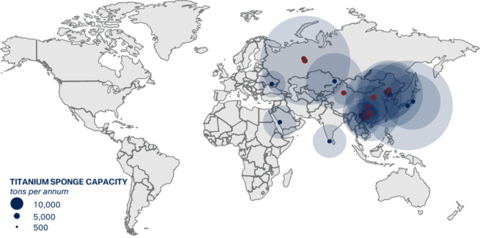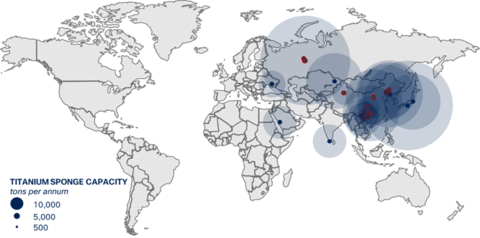CHARLOTTE, N.C.--(BUSINESS WIRE)--IperionX Limited (“IperionX”) (NASDAQ: IPX, ASX: IPX) is pleased to announce that it has partnered with Carver Pump (“Carver”) to use IperionX’s patented and award-winning titanium technologies to additively manufacture titanium pump components for the U.S. Navy. Carver will design the titanium pump components, guide IperionX on prototyping, and lead the qualification of these titanium pump components for the U.S. Navy.
Carver is the leading American designer and manufacturer of high-performance centrifugal pumps that have been used in every major U.S. Navy shipbuilding program for the past 60 years. The U.S. Navy prizes titanium pumps for their exceptional corrosion resistance, and they are used across a wide range of naval applications including fire suppression, seawater cooling, main propulsion seawater, bilge, and desalination.
The U.S. has no domestic capacity to manufacture the large titanium castings required for high performance centrifugal pumps, and this has led to long lead times for new pump components sourced from a foreign controlled supply chain that exploits high cost and carbon intensive titanium metal.
IperionX’s lower cost, lower carbon, U.S. titanium powders can be used to additively manufacture these specialized titanium pump components, and this provides the U.S. Navy with the capability to significantly reduce lead times for critical parts, increase equipment availability, and sustainably re-shore a critical U.S. titanium metal supply chain.
The U.S. Navy’s, Naval Sea Systems Command (“NAVSEA”) has developed additive manufacturing processes for over 500 approved parts used in U.S. ships and submarines. The Governor of Virginia and the U.S. Navy are accelerating efforts to scale additive manufacturing, having recently opened the ‘Additive Manufacturing Center of Excellence’ in Danville, VA, located just 25 miles from the site of IperionX’s new Titanium Demonstration Facility in South Boston, VA.
Glenn Youngkin, Governor of Virginia said:
“In just four months, we’ve seen dynamic progress from IperionX. As they continue to develop synergies with Carver Pump and the U.S. Navy using 100% recycled titanium scrap as feedstock which will soon be produced in Halifax County, we look forward to seeing IperionX’s continued growth and success. This puts Virginia on the map for providing a critical material that is essential for our advanced industries including those exhibited just down the road at the U.S. Navy’s Additive Manufacturing Center of Excellence.”
High-performance pumps require high-performance materials
The U.S. Navy prizes titanium centrifugal pumps for their exceptional corrosion resistance, performance, and longevity in demanding naval applications. These pumps are critical for fire suppression, seawater cooling, radar and electronics cooling, main propulsion seawater, bilge, and desalination.
Carver has been providing high performance centrifugal pumps to the U.S. Navy since World War II. Carver pumps are installed on all current Navy ship building programs, including Ford Carriers, Zumwalt Destroyers, Aegis Destroyers, Littoral Combat Ships, America Big Deck Amphibious Assault Ships, San Antonio Amphibious Transport Docks, and Virginia Submarines.
High performance titanium pump components are mostly produced via titanium casting, a very high-cost manufacturing method which can present significant problems due to two key factors: titanium’s high melting point (1,670 °C) and high reactivity with oxygen. Therefore, to avoid unwanted reactivity, the specialized vacuum melting of titanium and then pouring into specially designed ceramic molds is required.
The U.S. no longer has the domestic capacity to produce large high performance titanium castings, with the key foreign suppliers now based in China, Russia, the United Kingdom, and Norway. China and Russia are the only countries that have fully integrated primary titanium metal production and large titanium casting capabilities, which places them in a superior competitive position. The United Kingdom and Norway are fully reliant on importing their primary titanium metal feedstock for casting production from foreign sources that use the high cost and carbon intensive Kroll titanium production process.
The U.S. has limited domestic production capacity for primary titanium metal (titanium sponge) and is mostly import reliant after Timet’s ‘Kroll’ titanium plant in Nevada closed in 2020. The global titanium supply chain is highly concentrated and dominated by China and Russia who now control over 70% of global metal production capacity. Given the lack of domestic titanium production capacity, and that the U.S. no longer maintains titanium sponge in the National Defense Stockpile, downstream titanium producers, including producers of goods such as ingot, billet, sheet, coil, and tube, are almost entirely dependent on foreign sources of titanium.
IperionX’s patented technologies offer a pathway to lower cost, lower carbon, U.S. manufactured titanium components across a range of important industries including defense, aerospace, automotive, and consumer electronics. These patented titanium technologies can upcycle low-grade, high oxygen, out-of-specification titanium scrap metal to produce titanium metal that meets or exceeds industry standards.
IperionX is currently producing high quality titanium metal powders from 100% recycled titanium feedstocks for customer qualification at its titanium production pilot facility in Utah. This titanium production facility has achieved processing yields approaching 100% from low-grade scrap without the need for blending with high-grade primary titanium metal.
IperionX will re-shore a critical U.S. titanium supply chain
IperionX has successfully engaged with the U.S. Navy to detail the Company’s plans to sustainably re-shore the U.S. titanium supply chain, that aims to reduce critical titanium component lead times, lower costs, and reduce carbon emissions.
These discussions involved senior leadership in the U.S. Navy’s NAVSEA, including the Office of the Chief Engineer for Ship Design, Integration and Naval Engineering, the Shipbuilding Industrial Base Task Force and Program Executive Office – Strategic Submarines. IperionX has also been in discussions with the U.S. Defense Logistics Agency Strategic Materials agency on the potential for recycling titanium scrap inventory for use across the Defense Industrial Base. In addition, IperionX is collaborating with Naval Air Systems Command to produce flight critical 3D printed titanium components for Navy aircraft. These discussions build upon IperionX successfully winning the U.S. Air Force Research Laboratory's titanium recycling Grand Challenge and highlights the importance of sustainably re-shoring a U.S. titanium supply chain for domestic and allied defense industries.
The U.S. Navy’s NAVSEA has publicly stated targets to develop technical standards for additive manufactured components to increase operational readiness. These aim to manufacture obsolete and long-lead time components, and also enhance defense capabilities by manufacturing unique component designs not otherwise possible. Importantly, the current lead time for large, specialized titanium castings is approximately 1-2 years, compared to just 1-3 months when manufactured with titanium powders via additive manufacturing. IperionX’s patented technologies can recycle end-of-life titanium components into high quality titanium metal that can then be manufactured into new mission critical titanium parts on short timeframes.
Andrew Carver, Carver CEO said:
“We are delighted to be working with IperionX to help introduce domestic sourced, 100% recycled titanium into the U.S. Navy’s supply chain. When coupled with benefits of additive manufacturing, the partnership provides a significant potential to benefit to Navy operations through the rapid production of complex, operation critical titanium parts, providing a potential reduction in lead times and increasing equipment availability.
We see this partnership as the first step in a larger relationship focused on both Navy surface ships as well as new parts for other marine applications.”
Anastasios (Taso) Arima, IperionX CEO said:
“Our partnership with Carver is another important milestone for the rapid commercialization of IperionX’s breakthrough titanium technologies.
These patented technologies can efficiently recycle domestic titanium scrap metal at lower cost than existing processes, and this high-quality titanium metal can be used for a range of manufacturing technologies, including additive manufacturing. We look forward to working closely with Carver to rapidly prototype and deploy titanium components for a wide range of centrifugal pump applications in U.S. Navy platforms.”
About IperionX
IperionX’s mission is to be the leading developer of low carbon titanium for advanced industries including space, aerospace, electric vehicles, and 3D printing. IperionX’s breakthrough titanium technologies can produce titanium products that are low carbon and fully circular, and were developed by Dr. Zak Fang, an American Professor of Metallurgical Engineering at the University of Utah. IperionX is producing titanium metal powders from titanium scrap at its operational pilot facility in Utah and intends to scale production at a Titanium Demonstration Facility in Virginia. IperionX holds a 100% interest in the critical minerals Titan Project, which has the largest JORC resource of titanium, rare earth and zircon rich mineral sands in the U.S.A.
About Carver
Carver built their first pumps in 1938, and the Carver name has become synonymous with value. Carver Pumps are recognized as one of the world’s leading centrifugal pump companies, building pumps to the most demanding engineering specifications and military standards in the world. Carver Pump is headquartered in Muscatine, Iowa, where our pumps are engineered and manufactured. A third-generation family ownership and commitment to American manufacturing give our customers, partners and employees confidence.
Forward Looking Statements
Information included in this release constitutes forward-looking statements. Often, but not always, forward looking statements can generally be identified by the use of forward-looking words such as “may”, “will”, “expect”, “intend”, “plan”, “estimate”, “anticipate”, “continue”, and “guidance”, or other similar words and may include, without limitation, statements regarding plans, strategies and objectives of management, anticipated production or construction commencement dates and expected costs or production outputs.
Forward looking statements inherently involve known and unknown risks, uncertainties and other factors that may cause the Company’s actual results, performance, and achievements to differ materially from any future results, performance, or achievements. Relevant factors may include, but are not limited to, changes in commodity prices, foreign exchange fluctuations and general economic conditions, increased costs and demand for production inputs, the speculative nature of exploration and project development, including the risks of obtaining necessary licenses and permits and diminishing quantities or grades of reserves, the Company’s ability to comply with the relevant contractual terms to access the technologies, commercially scale its closed-loop titanium production processes, or protect its intellectual property rights, political and social risks, changes to the regulatory framework within which the Company operates or may in the future operate, environmental conditions including extreme weather conditions, recruitment and retention of personnel, industrial relations issues and litigation.
Forward looking statements are based on the Company and its management’s good faith assumptions relating to the financial, market, regulatory and other relevant environments that will exist and affect the Company’s business and operations in the future. The Company does not give any assurance that the assumptions on which forward looking statements are based will prove to be correct, or that the Company’s business or operations will not be affected in any material manner by these or other factors not foreseen or foreseeable by the Company or management or beyond the Company’s control.
Although the Company attempts and has attempted to identify factors that would cause actual actions, events or results to differ materially from those disclosed in forward looking statements, there may be other factors that could cause actual results, performance, achievements, or events not to be as anticipated, estimated or intended, and many events are beyond the reasonable control of the Company. Accordingly, readers are cautioned not to place undue reliance on forward looking statements. Forward looking statements in these materials speak only at the date of issue. Subject to any continuing obligations under applicable law or any relevant stock exchange listing rules, in providing this information the Company does not undertake any obligation to publicly update or revise any of the forward-looking statements or to advise of any change in events, conditions or circumstances on which any such statement is based.




